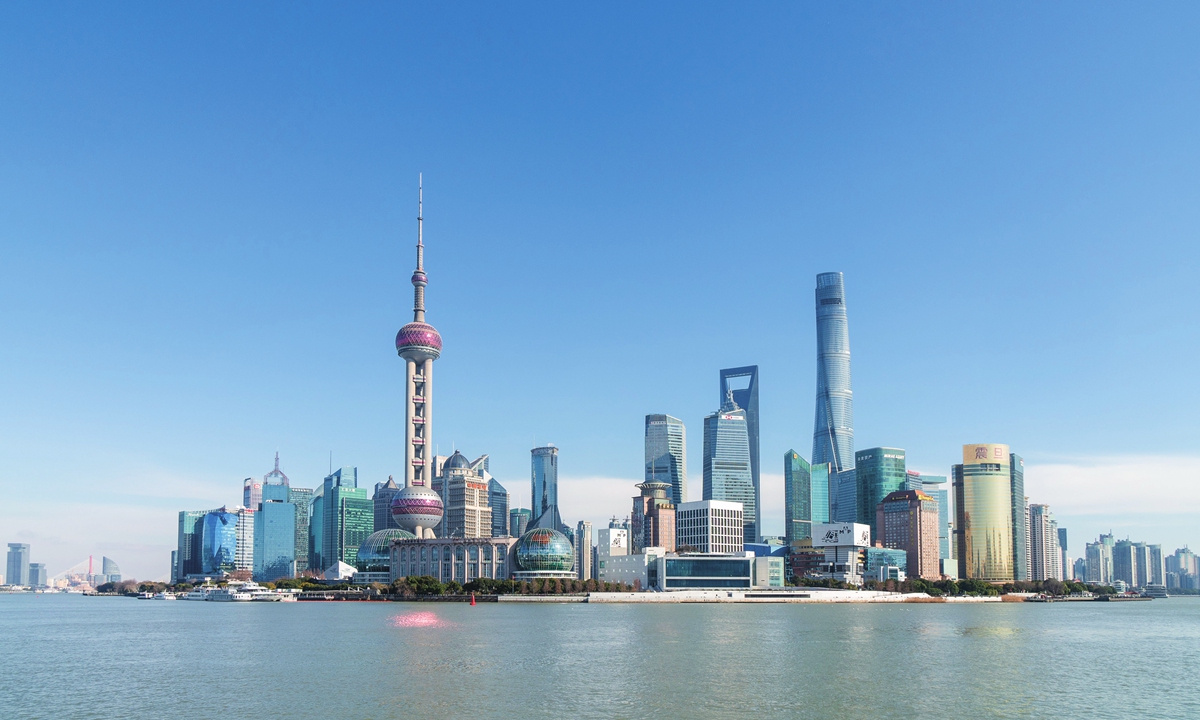

A view of the skyline of Lujiazui in Shanghai on January 24, 2024 Photo: VCG
Before the outbreak of COVID-19, the Chinese economy had experienced a relatively stable growth rate for many years. However, the virus had a significant impact on the economy. In 2020, thanks to effective measures in combating the virus, the Chinese economy quickly rebounded from a contraction.
By 2021, the economy started showing signs of good recovery, and people's confidence began to be gradually restored. However, new challenges emerged in 2022, and the situation in 2023 became even more difficult, even surpassing the difficulties the economy faced during the pandemic.
There are many reasons for these situations. While many people believe that insufficient consumption is the main culprit, in reality, according to retail sales data, China's consumption level has not significantly declined compared with previous years. In 2023, China's consumption grew by 7.2 percent, indicating that there is still potential for further growth.
According to official data, China's economy grew by 5.2 percent in 2023, with consumption contributing 82.5 percent to the growth. Despite concerns about insufficient consumption, the data showed that growth in 2023 was mainly driven by consumption.
We have seen bustling restaurants, airports and train stations, indicating a recovery in domestic consumption. However, bulk consumption, particularly related to real estate, has declined significantly.
Meanwhile, the contribution rate of investment to economic growth was 1.6 percentage points, accounting for 30 percent, slightly lower than the usual level. Typically, the contribution rate of investment can reach 2.0 percentage points or more to the GDP. Therefore, in 2023, domestic demand shortfall was not due to home consumption, but investment.
In 2023, China's exports declined slightly in dollar terms which reduced GDP growth by some 10 percent. However, it is important to note that the export decline was a global issue, not limited to China, although China's performance was relatively better compared with other countries like Vietnam, which experienced an export drop of 4.4 percent year-on-year. Nevertheless, a decline or slowdown in foreign demand has a significant impact on China's domestic demand.
Despite the difficulties, I have always had confidence in the Chinese economy's resilience and would maintain an optimistic outlook on its long-term growth. Pessimists only focus on current challenges, while optimists look forward to the future and we will be proven right.
According to my analysis, China still has a potential annual growth rate of 5-5.5 percent. If we fail to achieve this rate, we will not be fully utilizing our production capacity. China has a high savings rate and a complete industry chain, and it is a world leader in many technological fronts.
The era of low-quality, low-priced Chinese produce is over, and we have entered an era of good quality and reasonable prices. Take electric vehicles as an example: ordinary consumers no longer hesitate to choose domestic brands over overseas brands. Such a situation would have been unimaginable five years ago. This is a huge positive change.
The Central Economic Work Conference held in December 2023 proposed the principle of "establishing the new before abolishing the old." This means that the government will prioritize ensuring the stable operation of the economy before addressing other issues.
So I believe that the concept of "establishing the new before abolishing the old" is very valuable, and we should follow this principle.
I believe that the government will continue to make efforts to bolster the real estate industry, hoping that the real estate market can stabilize and stop declining in the second half of 2024. The stability of the real estate market is crucial for the economic recovery. At the same time, the financial situation of local governments needs to be improved to reduce its adverse impact on the economy.
With the current situation not that optimistic, international institutions generally predict that China's economic growth in 2024 will not exceed 4.5 percent. However, I believe that this prediction is somewhat pessimistic. The government has already realized that stabilizing the economy is a top priority, so I am full of hope for this year's economic performance. I believe that a growth rate of around 5 percent is within reach.
The article was excerpted and compiled from a recent speech of Yao Yang, economist and Boya chair professor at Peking University. bizopinion@globaltimes.com.cn



